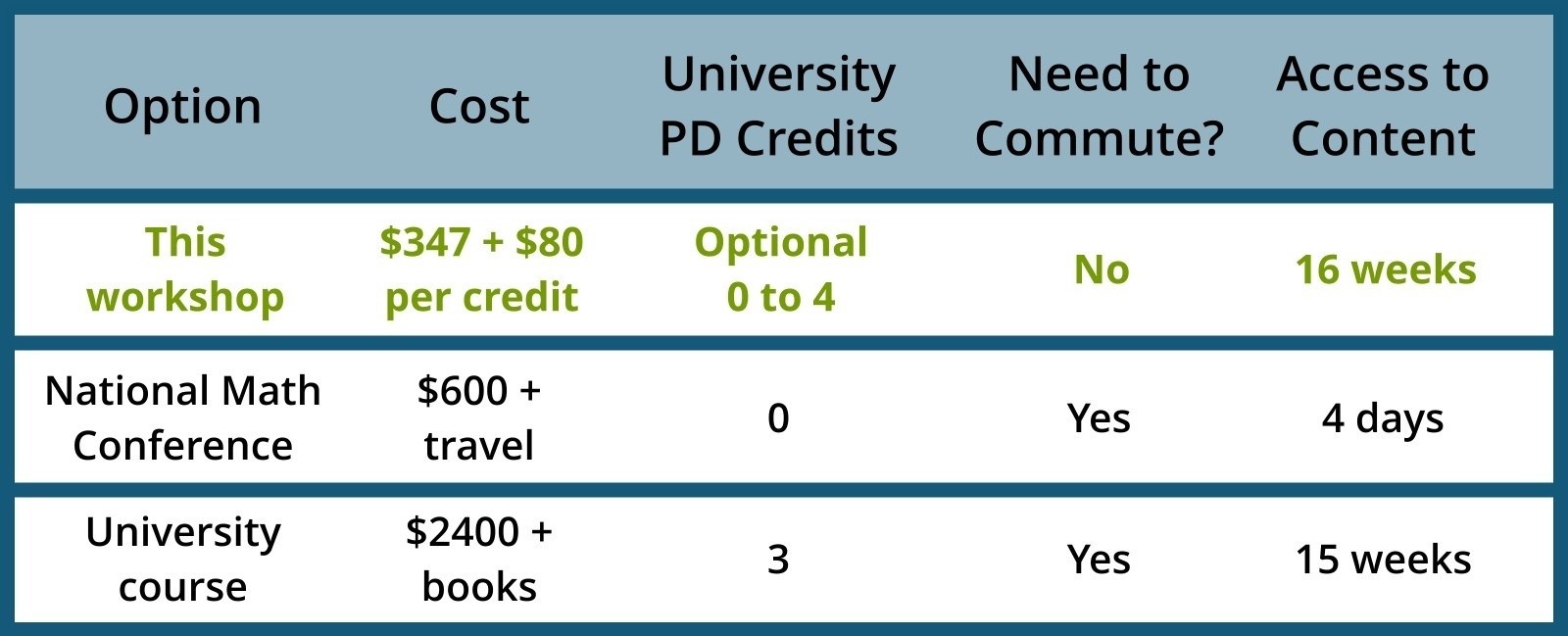What is in the Workshop?
Module 1: Math is Figureoutable!
What Will I Learn?
- What it means for math to be "figureoutable"
- How fractions fit in the overall development of mathematical reasoning
- Why it is important to develop reasoning, not just get answers
- Steps to take action in your classroom
Why Is This Important?
This is the why, the background, the setting that sets the stage for the rest of the workshop, so that you can implement lessons and strategies knowing how it all fits together.
___________________________________________________
Module 2: The Multiple Meanings of Fractions
What Will I Learn?
- What it can look like to think and reason about fractions
- What the difference is between relative and absolute thinking and how that affects fraction understanding
- The five meanings of a/b: part-whole, measurement, ratio, operator, and quotient
Why Is This Important?
Students need to develop more than part-whole relationship ideas in order to develop fluency with fractions. Teachers need to know the five meanings of a/b to ensure that students get experiences with all five meanings.
___________________________________________________
Module 3: The Whole Matters
What Will I Learn?
- Why it is important to define the "whole" or "unit" when using part-whole relationships
- Activities to help students reunitize the whole
- Ways to help students build relationships such as "half can be represented as one out of two objects, but half also means 50 out of 100 objects"
- How to help students build and recognize equivalent fractions
Why Is This Important?
Students need to experience part-whole relationships where the defined unit changes so they can feel what it means for fractions to be equivalent. Equivalent relationships are necessary to developing fluency and flexibility in problem solving. When students can identify an equivalent fraction, they can use the fraction that best helps them solve a given problem.
___________________________________________________
Module 4: Equipartitioning, Number Line & Fractions
What Will I Learn?
- What a "unit fraction" is and why it is a foundational fraction idea
- Problem Strings to build operator meaning and multiplicative relationships
- How to use manipulatives effectively with students to build relationships
- How to get students thinking about multiplying and dividing by fractions without using memorized, step-by-step procedures
- The necessary models to support fraction understanding
Why Is This Important?
All this is aimed at providing students with many types of experiences in order to build connections and relationships. When students learn through a variety of contexts, models, and activities, they can think and reason through fraction operations instead of rote memorizing (and misapplying) step-by-step procedures.
___________________________________________________
Module 5: Comparing & Ordering, Equivalence, Fractions as Quantities
What Will I Learn?
- Problem Strings to develop relative magnitude relationships based on multiplicative concepts
- How to use landmark fractions from money and clock models to add and subtract fractions without algorithms or finding lowest common multiples
Why Is This Important?
As students build mental relationships about numbers, they can use what they know to solve problems. We need to support students as they build these relationships so they can think and reason about fractions. Fractions are figureoutable!
___________________________________________________
Module 6: Top 3 Types of Tasks for Student Success
What Will I Learn?
- Three important instructional routines that support students in building relationships and sense making
- How to sequence lessons to maximize learning
- Steps to implement to take action in your classroom
Why Is This Important?
Students need lots of experience with fractions as they build relationships and understanding. The experiences are more powerful when crafted together in purposeful ways. We want to get the most benefit of what we do in the classroom to keep students learning and progressing.
___________________________________________________
Module 7: High-leverage Teacher Moves to Move the Math Forward
What Will I Learn?
- High-leverage teacher moves to encourage student sense making
- Teacher moves that support equity and access
- Teacher moves to differentiate — to support and challenge all learners
- How to support meaningful discourse to facilitate learning
- Steps to implement to take action in your classroom
Why Is This Important?
Even with all the cool activities you will learn in this workshop, it is still easy to flub a lesson. In this module, you’ll learn the high-level teacher moves that make the learning happen like a pro.
___________________________________________________
Live Q&A With Pam
During the workshop you will have the opportunity to submit questions to Pam for her to answer during a live Q&A. This Q&A will be recorded and you will have access to it.





